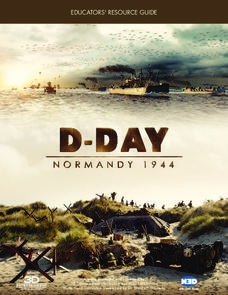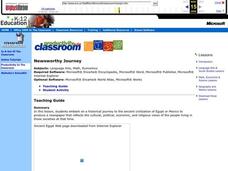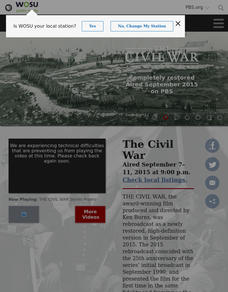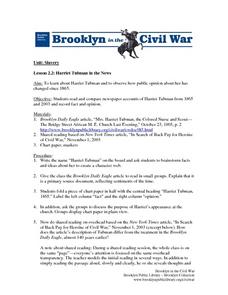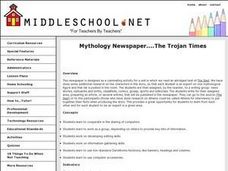Curated OER
Leaders in Journalism
Students examine the changing leadership roles and qualities of writers, journalists and editors in public life. They view short video clips by prominent journalists and read about various journalists in history.
D-Day Normandy 1944
D-Day Normandy 1944
No study of World War II would be complete without an in-depth examination of the events of June 6, 1944. Pascal Vuong's D-Day Normandy:1944, is the perfect vehicle to convey the sheer magnitude of the events that have been called the...
Teach Engineering
Weather Forecasting
According to the Farmers' Almanac, the weather will be nice today. Class members examine how weather forecasting plays a part in their lives with a resource that provides information on the history of forecasting, from using cloud...
Stanford University
Hurricane Katrina
The adage says that journalism is the first draft of history. How should people evaluate these sources of information? Taking into account various sources, including those from various perspectives and different creators, learners...
Curated OER
The Imperial Republic: 1865-1914 (6)
In this online interactive American history worksheet, high schoolers respond to 12 matching questions regarding 1865-1914 America. Students may check their answers immediately.
Curated OER
Drawing on Terror
Learners assess the ways in which editorial cartoons offer insight into events that shape our world, specifically focusing on the September 11, 2001 terrorist attacks on the United States.
Curated OER
Newsworthy Journey
Students conduct Internet research about ancient civilizations to produce a newspaper that reflecting the cultural, political, economic and religious views of the ancient civilizations of Egypt or Mexico.
Curated OER
The Ancient Times
Learners create a newspaper sharing stories of Cleopatra before her death. They use the internet to research information about her and the time in which she lived. They share their newspaper articles with others.
Curated OER
Stonehenge: Solving Ancient Mysteries
Learners explore archeologists and anthropologists and the tools and methods they use to gather and interpret scientific evidence. They research current archaeological excavations and contact the scientists working at these digs.
Curated OER
History: Sherman's March to the Sea
Students analyze two sources. First, they will look at a letter written by Sherman to Grant as Sherman's army approached Savannah. Second, they will review the lyrics to the popular song of that period, Marching Through Georgia.
Curated OER
History: Robert Gould Shaw and the 54th Massachusetts
Students read a letter by Shaw to his wife after the Union raid at Darien, Georgia; then will draw conclusions about it. Students debate about the Emancipation Proclamation as well as the possibility of allowing blacks to serve in the...
Curated OER
Harriet Tubman In The News
Students investigate the history of Harriet Tubman. They use newspaper articles from history and modern times in order to gather information. They use a graphic organizer in order to categorize information. They distinguish the readings...
Curated OER
Mythology Newspaper....The Trojan Times
Students are assigned to a writing group: news stories, obituaries and births, classifieds, comics, gossip, sports and editorials. The newspaper covers mythological figures in history. This is a very clever, meaningful lesson in mythology!
Curated OER
Medieval Newspaper
Sixth graders create a Medieval newspaper. In this history lesson students work in groups to write portions of a Medieval newspaper. The articles are compiled to complete a newspaper. Extra or additional articles are also assigned to...
Curated OER
Broadcast from the Past
Students will be responsible for presenting (either performing live or videotaping and playing) a newscast dealing with an aspect of the Civil Rights Movement that connects to the unit topic of media and social justice. During the...
American Press Institute
Newspapers in Your Life: What’s News Where?
Big news isn't necessarily newsworthy everywhere! How do journalists decide what to cover with so much happening around them? A instructional activity on media literacy examines the factors that affect the media's choice of stories to...
Media Smarts
Selling Tobacco
Take a look at tobacco advertising techniques through the decades. Students analyze the differences in strategies, and write an essay on the advertising history of one brand of tobacco, how tobacco advertising has changed over time, or...
Facing History and Ourselves
Social Media and Ferguson
How can social media help or hinder civil dialogue? How can information shared on social media be verified? As the investigation of media reports of the events surrounding the shooting of Michael Brown continues, class members read news...
Facing History and Ourselves
Citizen Watchdogs and the News
To conclude their case study of media coverage of the shooting of Michael Brown by a Ferguson, Missouri, police officer, class members consider the role of citizen watchdogs in a democratic society, develop strategies for combating...
Facing History and Ourselves
Preparing Students for Difficult Converstaitons
Many of the issues facing 21st Century learners are challenging and even discussing these issues can be a challenge. So how do teachers prepare learners for these difficult conversations? How do instructors create a safe classroom where...
Facing History and Ourselves
#IfTheyGunnedMeDown
As part of their continued investigation of the reporting of the shooting of Michael Brown class members analyze photos of Michael Brown and the social media response to these images. The class then develops a guide they believe news...
Facing History and Ourselves
The Importance of a Free Press
"Congress shall make no law . . . abridging the freedom of speech, or of the press;. . ." Why is this guarantee of free speech and a free press the First Amendment to the US Constitution? Why are these rights so essential to a democracy?...
Facing History and Ourselves
The Power of Images
One picture but a thousand stories. As a part of a case study of how the death of Michael Brown was reported by professional news sources and on social media class members examine the reactions of various groups to a photograph taken by...
Facing History and Ourselves
How Journalists Minimize Bias
Class members are challenged to write a neutral news story about the events they observe in a short video. After sharing their stories in groups and discussing the different perceptions, the class concludes with a video of journalists...



